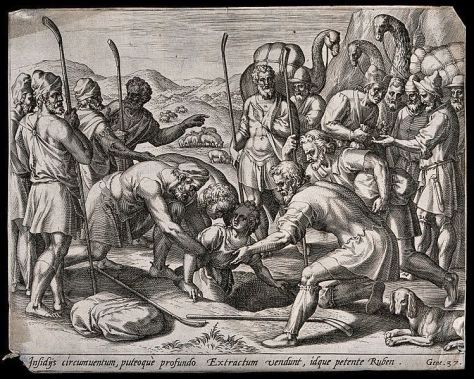Victim’s Collusion (Vayeshev)
Silence is the ultimate weapon of power. -Charles De Gaulle
Joseph’s half-brothers hate him. The hatred is so deep, that they conspire to kill him. However, at the last moment, brother Judah suggests that they sell Joseph into slavery rather than kill him. Joseph is transported from the land of Canaan, south, to the Egyptian empire, where he becomes Potiphar’s slave. Though he excels in his servitude, Potiphar’s wife, whose advances upon Joseph are rejected, ultimately accuses Joseph of accosting her, landing him in prison.
Joseph is eventually released, due to his dream-interpretation skills. By successfully interpreting Pharaoh’s dreams, Joseph is elevated to the post of Viceroy of the Egyptian empire, a role he had been filling for nine years, before he meets his brothers again. Then he starts the strange charade of remaining unrevealed to them, forcing his full-brother Benjamin to come to Egypt, threatening to force Benjamin into slavery on trumped up charges, and only later revealing himself to his brothers, and subsequently they relay his prominence and wellbeing to their father, Jacob.
The big question that vexes many of the commentaries is why didn’t Joseph communicate with his family beforehand? Why, when he was in a position of tremendous power, did he not send a message to his beloved father that he was alive and well? Why did he let his father believe he was dead or missing all those years?
The Bechor Shor on Genesis 37:26, takes us back to the original sale of Joseph into slavery to answer the question. The brothers really had intended to kill him, or at the very least to let him die in the pit they had thrown him into. But Judah, a savvy negotiator, declared to his brothers: “We gain nothing by his death. If we sell him, at least we gain something, and it removes our hated brother from our midst.” Then they give Joseph a choice: “Either we let you die as planned, or we sell you into slavery on condition that you never reveal your identity or origins to anyone, that you never return home nor contact our father.”
Joseph has no choice but to keep his silence and never contact his family. The purpose of the charade with the brothers then becomes clearer. Joseph couldn’t just declare that he was Joseph when his brothers first meet him in Egypt. That likely would not have gone well and the family rapprochement wouldn’t have occurred. They needed to go through a few steps first to undue the damage of selling him into slavery. When Judah, who initially sold Joseph into slavery then saves Benjamin from a similar fate, they are redeemed. This then allows the brothers, of their own volition, to suspend the enforced silence, to inform their father as to Joseph’s wellbeing and to bring him to Joseph in Egypt, which is what they go on to do.
Joseph’s silence and collusion with his brothers in his own harsh fate were painful, but he had little other choice. In the end, he was able to overcome his circumstances, and reunite the family.
May we only use silence in a positive way.
Shabbat Shalom,
Ben-Tzion
Dedication
To the memory of Chuck Yeager, the man who broke the sound barrier, who passed away this week.


















